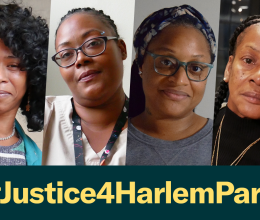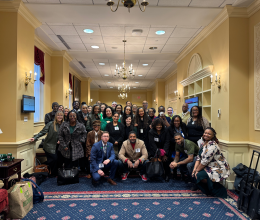
BALTIMORE – Four residents of Baltimore’s Harlem Park neighborhood who filed a federal court lawsuit against the Baltimore City Police Department (BPD) and former Police Commissioner Kevin Davis charging that their state and federal constitutional rights were violated during a six-day, multi-block lockdown of their neighborhood following the death of Detective Sean Suiter announced today that they have settled their lawsuit and the city has issued a rare public apology.
“It felt good to stand up against something you knew was wrong and make a difference. I feel good about the settlement and glad the city decided to agree to our demands,” said Juaqueta Bullock, one of the plaintiffs. “The most important thing is that the incident won’t ever happen again. They will have to do things the right way and not harass people.”
In November 2017, following the death of Det. Sean Suiter, BPD imposed a lockdown of Harlem Park, a predominately Black neighborhood. During the lockdown, the residents of Harlem Park were routinely stopped by police, without any individualized suspicion of wrongdoing, when they came and went from their homes. They were required to identify themselves, and their names were run through law enforcement databases. Police officers were posted at each block, alleyway, and corner, and police checkpoints were at each intersection.
“I’m proud that this wasn’t overlooked and that the voices of the people were heard. I’m happy to teach my children that when there’s injustice, we can speak up. I appreciate the apology from the city and hope that going forward they don’t have to issue any more apologies for this type of incident,” said Lauren Holmes, one of the plaintiffs. “People felt imprisoned in their homes, couldn’t get to work and missed paychecks. Now, the city government is taking responsibility for the trauma they put us through.”
In an apology from the City and the Baltimore Police Department, BPD Commissioner Michael S. Harrison said: “On behalf of the City of Baltimore and the Baltimore Police Department, I would like to express our sincere regret and apology for the disruptive events that you and your family experienced as a result of the prolonged police perimeter in the Harlem Park neighborhood, from Wednesday, November 15, to Monday, November 20, 2017. … Amid the investigation of the tragic death of Detective Sean Suiter, the BPD men and women tasked with maintaining the crime scene perimeter were not guided by adequate supervision to reinforce constitutional requirements for stops and searches. … The result was a protracted police presence that was not aligned with any national best practice for investigations nor any true community policing model. … I am deeply saddened and troubled that these events have shaken your faith and trust in the police who are sworn to serve and protect the City’s residents, and that you feel a diminished sense of comfort and security, to which all Baltimore City residents are entitled."
The settlement requires BPD to adopt and enforce policies aimed at ensuring that nothing similar happens again:
- Crime scene boundaries and durations must be “tied to the nature and facts of the crime being investigated, independent from the identity of the victim and the demographics of the neighborhood.”
- Any searches of residences within a crime scene must be completed within four hours, unless additional time is justified and authorized in writing by supervisors.
- Residents and their guests may not be prohibited from accessing their residences unless there is an emergency need to preserve evidence in the residence, or an immediate danger to the resident or guest, such as an active shooter situation.
- Specific written justification is required for including within a crime scene boundary the entrance to any residence that is not itself the location of the crime.
- BPD officers are prohibited from questioning or seeking identification from residents or guests seeking to come or go from their home within a crime scene boundary if they are being escorted to preserve the integrity of the crime scene.
The settlement also gives the plaintiffs the ability to monitor and enforce BPD’s adherence to these policies to make sure they are enforced, and will require expunging any records that the BPD created during the lockdown that relate to the plaintiffs or others in their household. Finally, the settlement pays damages of $24,000 to each plaintiff, and gives each of them a formal, written apology from the Police Commissioner about the incident.
David Rocah, Senior Staff Attorney at the ACLU of Maryland, said: “What happened in Harlem Park needed to be challenged. It was a flagrant violation of the law, and it is not enough for the City to say ‘whoops, our bad, we’ll do better next time.’”
“This settlement represents an important vindication of rights not only for these particular plaintiffs, but for the entire Harlem Park community,” said Crowell & Moring Partner Dan Wolff. “Crowell is honored that these brave individuals placed their trust in Crowell to bring this impactful lawsuit on their behalf along with our incredible and tireless co-counsel at the ACLU of Maryland.”
“There is no justice without accountability,” said Crowell & Moring Associate Helen Osun. “It is an honor to be a part of a team seeking justice for a group of individuals who demanded not only justice for themselves and their community, but accountability from the City.”
Lauren Holmes, Nicole Lee, Luella Lawson, and Juaqueta Bullock are represented by Daniel W. Wolff, Astor Heaven, Helen Osun, Siri Rao, and Eli Berns-Zieve of Crowell & Moring LLP, and David Rocah, senior staff attorney for the ACLU of Maryland.
Learn more about Holmes v. Baltimore Police Department, here.

